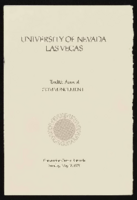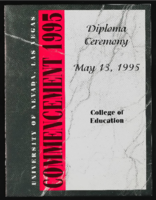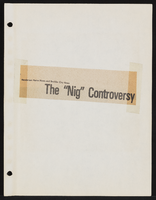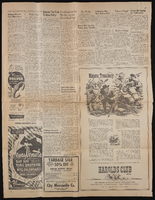Search the Special Collections and Archives Portal
Search Results
UNLV Libraries Collection of Gold Strike Resorts Inc. Promotional and Press Materials
Identifier
Abstract
The UNLV Libraries Collection of Gold Strike Resorts Inc. Promotional and Press Materials includes promotional materials, company newsletters, and newspaper clippings for Gold Strike Resorts Inc. located in Jean, Nevada dating from 1986 to 2005.
Archival Collection

University of Nevada, Las Vegas (UNLV) 12th commencement program
Date
Archival Collection
Description
Commencement program from University of Nevada, Las Vegas Commencement Programs and Graduation Lists (UA-00115).
Text

University of Nevada, Las Vegas (UNLV) 41st commencement program
Date
Archival Collection
Description
Commencement program from University of Nevada, Las Vegas Commencement Programs and Graduation Lists (UA-00115).
Text

University of Nevada, Las Vegas (UNLV) College of Education Diploma Ceremony program
Date
Archival Collection
Description
Commencement program from University of Nevada, Las Vegas Commencement Programs and Graduation Lists (UA-00115).
Text

Transcript of interview with Edna Jackson-Ferguson, April 15, 1975
Date
Archival Collection
Description
On April 15, 1975, Edna Jackson-Ferguson (born 1897 in Overbrook, Kansas) provided a narrative-style oral history about her and her husband Jack’s experiences during the building of the Hoover Dam. Jackson-Ferguson provides many details about the way of life living in the camp with workers of the dam, the tasks required of those workers in building the dam, and some of the actual processes of pouring the concrete for the structure. She also talks about food, transportation, weather, and entertainment during the time. To conclude the interview, Jackson-Ferguson mentions some of the other job positions her husband held and their pride in being a part of the Hoover Dam’s construction.
Text

Binder of news clippings and correspondence regarding the controversy over a Hoover Dam plaque honoring the dog mascot of damsite workers (contains racist materials)
Date
Archival Collection
Description
From the Roosevelt Fitzgerald Professional Papers (MS-01082) -- Personal and professional papers file.
Mixed Content
Harrah’s Entertainment Corporate Archives
Identifier
Abstract
The Harrah’s Entertainment Corporate Archives (dating from 1811 to 2004 with the bulk of the materials dating from 1940 to 2000) contain the promotional and corporate files of Harrah’s Entertainment Inc. and its predecessors, as well as Bill Harrah’s personal papers and card game collection. The materials were compiled and developed as a corporate archive by Harrah's Entertainment, Inc.’s Corporate Communications Department. The collection is primarily comprised of casino and employee periodicals, reports, manuals, promotional files, ephemera, and newspaper articles that document Bill Harrah’s casinos in Reno, Nevada and Lake Tahoe as well as Harrah’s Inc., Holiday Inns, Inc., Holiday Corporation, the Promus Companies, and Harrah’s Entertainment, Inc. Also included are photographs that document the construction of Harrah’s properties, business operations, the people who worked and performed at Harrah’s properties, and Bill Harrah’s automobile collection. The collection also contains Bill Harrah’s collection of playing cards and card games. Also included are photographs of the Harrah family.
Archival Collection

Transcript of interview with Nancy Horden by Ward Murashige, February 26, 1980
Date
Archival Collection
Description
On February 26, 1980, collector Ward Murashige interviewed Nancy Horden (born February 7th, 1921 in Las Vegas, Nevada) in James Dickenson Library at the University of Nevada, Las Vegas. The interview covers Nancy’s family background, and life in Nevada, including home life, recreation, and hobbies. During this interview, Nancy also discusses local development, and the social and environmental changes that have occurred over the span of her lifetime in Las Vegas, Nevada.
Text


